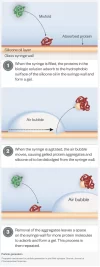So that proves how hard impact is one way in which peptides degrade by mechanical force.
The other is related to the fact peptides stick, "adsorb" to the walls of their containers (unless steps are taken to prevent it with excipients and special materials, like pharma does). Once they adsorb, they become malformed, oxidize (from the ingredients in the glass or plastic), and other peptide molecules can stick to them forming larger aggregates.
If these are left undisturbed, it's just a little
lost peptide. But when shaken, bubbles can knock them into the solution to be injected. Also, whatever caused the adsorption at the spot in the first place, an impurity like a little silicon, or a defect in the glass, is now vacant and another peptide molecule can stick there starting the process all over again.
View attachment 308289


